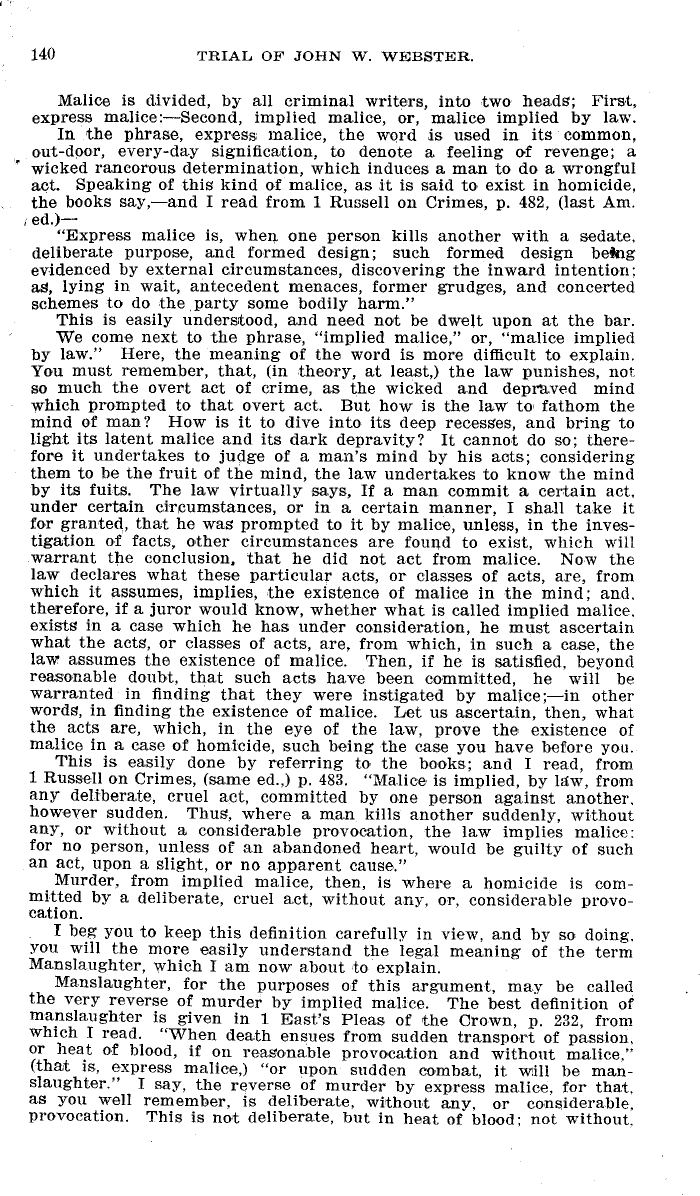|
140 TRIAL OF JOHN W. WEBSTER.
Malice is divided, by all criminal writers, into two heads; First,
express malice:-Second, implied malice, or, malice implied by law.
In the phrase, express malice, the word is used in its common,
out-door, every-day signification, to denote a feeling of revenge; a
wicked rancorous determination, which induces a man to do a wrongful
act. Speaking of this kind of malice, as it is said to exist in homicide,
the books say,-and I read from 1 Russell on Crimes, p. 482, (last Am.
ed.)-
"Express malice is, when one person kills another with a sedate,
deliberate purpose, and formed design; such formed design beffng
evidenced by external circumstances, discovering the inward intention:
as, lying in wait, antecedent menaces, former grudges, and concerted
schemes to do the , party some bodily harm."
This is easily understood, and need not be dwelt upon at the bar.
We come next to the phrase, "implied malice," or, "malice implied
by law." Here, the meaning of the word is more difficult to explain.
You must remember, that, (in theory, at least,) the law punishes, nor
so much the overt act of crime, as the wicked and depraved mind
which prompted to that overt act. But how is the law to fathom the
mind of man? How is it to dive into its deep recesses, and bring to
light its latent malice and its dark depravity? It cannot do so; there-
fore it undertakes to judge of a man's mind by his ants; considering
them to be the fruit of the mind, the law undertakes to know the mind
by its fuits. The law virtually says, If a man commit a certain act,
under certain circumstances, or in a certain manner, I shall take it
for granted, that he was prompted to it by malice, unless, in the inves-
tigation of facts, other circumstances are found to exist, which will
warrant the conclusion, that he did not act from malice. Now the
law declares what these particular acts, or classes of acts, are, from
which it assumes, implies, .the existence of malice in the mind; and,
therefore, if a juror would know, whether what is called implied malice,
exists in a case which he has under consideration, he must ascertain
what the acts, or classes of acts, are, from which, in such a case, the
law assumes the existence of malice. Then, if he is satisfied, beyond
reasonable doubt, that such acts have been committed, he will be
warranted in finding that they were instigated by malice; in other
words, in finding the existence of malice. Let us ascertain, then, what
the acts are, which, in the eye of the taw, prove the existence of
malice in a case of homicide, such being the case you have before you.
This is easily done by referring to the books; and I read, from
1 Russell on Crimes, (same ed.,) p. 483. "Malice is implied, by law, from
any deliberate, cruel act, committed by one person against another,
however sudden. Thus, where a man kills another suddenly, without
any, or without a considerable provocation, the law implies malice:
for no person, unless of an abandoned heart, would be guilty of such
an act, upon a slight, or no apparent cause."
Murder, from implied malice, then, is where a homicide is com-
mitted by a deliberate, cruel act, without any, or, considerable provo-
cation.
I beg you to keep this definition carefully in view, and by so doing.
You will the more easily understand the legal meaning of the term
Manslaughter, which I am now about to explain.
Manslaughter, for the purposes of this argument, may be called
the very reverse of murder by implied malice. The best definition of
manslaughter is given in 1 East's Pleas of the Crown, p. 232, from
which I read. "When death ensues from sudden transport of passion,
or heat of blood, if on reasonable provocation and without malice,"
(that is, express malice,) "or upon sudden combat, it will be man-
slaughter." I say, the reverse of murder by express malice, for that,
as you well remember, is deliberate, without any, or considerable,
provocation. This is not deliberate, but in heat of blood; not without.
|

